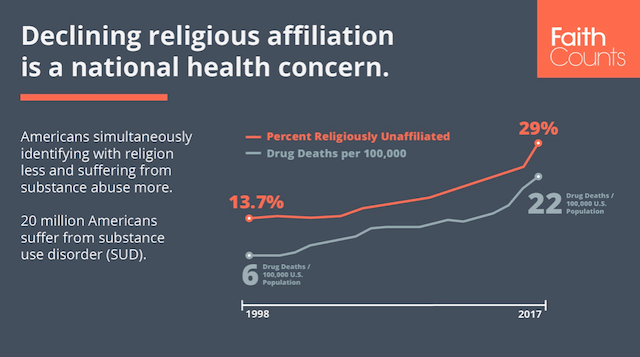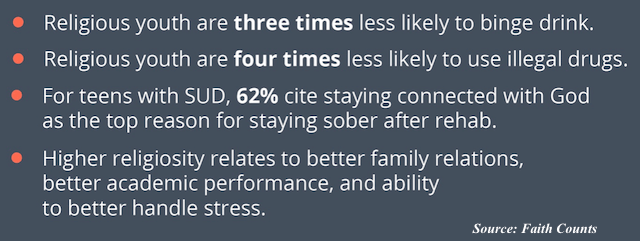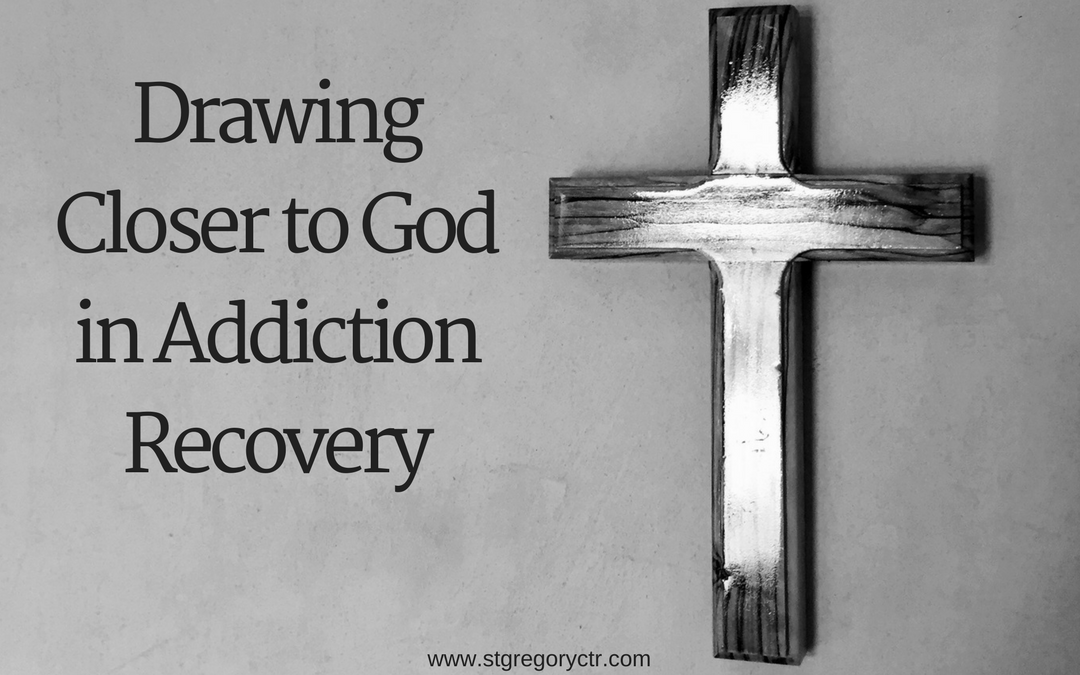Why Is Faith Important in Recovery?
Faith can play a significant role in personal growth. Whether one considers themselves spiritual, religious, or neither, faith remains one of the essential steps in addiction recovery. Why is this so?
What Is Faith?
Faith is a term interconnected to spirituality and religion, although faith is not just believing in a Higher Power. One does not have to experience religion for faith to play a role in recovery, either. In more general terms, faith is expressing hope for something greater or better to come. Faith is different from believing because beliefs are rooted in the conscious mind. When intentionally practiced, faith can be powerfully rooted in the subconscious mind, fostering more positive thoughts and attitudes about the recovery process. A positive subconscious mind will facilitate more extraordinary conscious actions towards sobriety.
Faith Fosters Forgiveness
Where there is faith, there is forgiveness. Addiction is more than an ongoing battle with a particular substance or an activity. Addiction takes its toll on friendships and family relationships and can negatively affect the relationship that one has with themselves. While recovery begins with acknowledging the problem at hand, mistakes can and still do happen.
With all of this comes the personal need for forgiveness. Some may seek forgiveness from loved ones, and many may seek forgiveness from themselves. Forgiveness involves releasing expectations that were once set about how someone should act or behave, and instead, accepting others for who they are. Forgiveness ties into faith because it is a combination of releasing expectations and working towards something better. Faith teaches how to forgive others and to forgive oneself. Forgiving oneself may be one of the most challenging acts to do in recovery, but it is a necessary part of the process.
Faith Fosters Confidence
Another reason faith is so crucial in the recovery process is that it builds individuals’ confidence to ask for help. Once an addiction has been acknowledged, it takes dedication and motivation to continue the recovery process. Many may struggle with asking for the next step to take in their journey, especially when asking where to begin in the first place. When one has faith that their situation will get better, they are more likely to accept help and let others help them on their journey. Addiction recovery is not meant to be experienced alone.
Faith Fosters Support
When an individual recognizes the need for recovery, life can start to feel like a standstill. But many forget that acknowledging the need for change is one of the most challenging steps in the recovery process. Once it is recognized, the individual seeking help needs encouragement and support from their community to find resources and opportunities for recovery.
It is common for family and friends to identify addiction before an individual identifies with it themselves. The faith that family and friends hold for a specific individual is powerful. It may be just as important and influential as the faith built by the individual struggling with addiction. It is necessary to express faith to anyone experiencing a journey of recovery. It recognizes that their battle will be difficult but reiterates that their battle is not impossible to win. More so, to instill faith in the heart of someone experiencing addiction is to instill empathy and a great love for humanity as a whole.
How to Gain Faith
Faith is a necessary part of recovery. However, how does one gain the confidence to have faith in their recovery? One place to start would include community support groups. Support groups give individuals an opportunity to connect with others experiencing the same obstacles in their lives. Experiencing a community support group can help individuals to feel empowered in their recovery process, regardless of where they are in their journey.
Support groups also help normalize mistakes that may happen over time and help others make connections with people who want to better their lives. It says a lot for someone to walk into a support group, let alone stick with it for some time. It is a beautifully difficult, incredibly brave step to surrender one’s struggle to a group of strangers. However, it helps when everyone else wants to be better and wants others to be better, too.
Another way to gain the confidence to have faith in recovery would be to listen to stories from those that consider themselves “recovered.” Some so many people have walked the same shoes, have experienced the same addiction, and are no longer in the place of suffering. Their stories are insightful, encouraging, and uplifting. It helps to hear that recovery is experienced by many people and overcome by many as well. These individuals will tell you about their continuous faith in themselves and their willingness to push forward despite their intensely difficult journeys. Listening to stories of faith will instill faith within.
Faith Is Crucial in Recovery
Cambridge Dictionary defines faith as “great trust or confidence in something or someone.” For those that are in recovery and are religious, having faith may look like trusting God for the ability to endure personal healing. For those that are in recovery and are not religious, having faith may be building up personal confidence in oneself to overcome addiction. Regardless, having faith in something or someone empowers individuals to keep moving forward.
Recovery becomes more intentional when faith is involved. Faith helps with the forgiveness of others and oneself and helps build the confidence to ask for help. Seek connections with others that will help to foster faith within. Take time to listen to stories of faith and the long-lasting effects that come with it. Faith just may be the most necessary part of one’s recovery process.
The Advantages of Prayer for Addiction Recovery
Many people underestimate the effects of prayer in our lives, but for someone in recovery from a substance abuse problem, praying can come with several added benefits. At Faith in Recovery, we are looking at the power of Christian prayer for recovery to help you through the good times and the bad.
At Faith in Recovery, we understand that reading scripture and prayer can help people recovering from substance abuse heal from the inside out. A person’s spiritual state should never be neglected in sobriety.
The Benefits of Prayer for Drug Addiction
A.W. Tozer famously said, “What comes to your mind when you think about God is the most important thing about you.” If you see God as slow to anger and abounding in loving-kindness (Exodus 34:6), then you’re more likely to find comfort in prayer for addiction recovery.
While many people underestimate the effects of prayer in our lives, praying can come with several added benefits for someone recovering from a substance use problem. At our Christian drug rehabilitation center, we look at the power of scripture and Christian prayer in recovery to help you through the good times and the bad.
Hope
Recovery from addiction can be a trying time. There may be days when you feel like giving up and caving into your cravings, but one of the benefits of praying in addiction recovery is that it can give you hope. When you are feeling weak or struggling, “Do not grieve, for the joy of the Lord is your strength” (Nehemiah 8:10). Praying can also remind you that you are never alone in your recovery journey and give you hope for a better future.
Improved Mental Health
Drugs and alcohol can have a major impact on a person’s mental health. Fortunately, prayer also addresses these issues. Some research suggests that regularly praying can lead to mental health benefits. In some cases, prayer has been found to reduce anger, feelings of aggression, anxiety, and depression. 1,2 Prayer can offer some relief for someone in early recovery who may be experiencing these emotions frequently as they adjust to a new lifestyle.
Self-Reflection
Another advantage of prayer for addiction recovery is its promotion of daily self-reflection. We see this often in clients who recently completed one of our faith-based addiction recovery programs and are new to recovery. These individuals are often still trying to figure out how to navigate their sobriety.
Life can be overwhelming, drug triggers can be everywhere, and there are both good and bad days. However, prayer in recovery allows people to properly manage these distractions and get through difficult moments. As it says in 1 Corinthians 10:13, “No temptation has overtaken you except such as is common to man; but God is faithful, who will not allow you to be tempted beyond what you are able, but with the temptation will also make the way of escape, that you may be able to bear it.” This moment of pause can help individuals in recovery better recognize their emotions and responses to distractions, as well as learn how to react better in the future.
Routine
Many people in recovery benefit from having a set routine in place. In fact, this is something we recommend to all patients in our Christian-based recovery programs. A schedule keeps them going when they may otherwise get complacent with their sobriety. It also leaves less room for boredom.
One of the many benefits of praying every day in recovery is that it helps keep a routine. Whether you pray when you first wake up or right before bed, these few minutes of prayer can help you get back into your routine when you may have otherwise started to stay away from the healthy routine you originally created.
Physical Health Benefits
There may also be some physical health benefits of prayer for sobriety. Research has found correlations between positive religious coping, like praying, among hospitalized patients with improvements in physical health.3 For people in recovery whose bodies are still healing from the damaging effects of drugs and alcohol, praying may help them remain patient, hopeful, and consistent through this process.
Better Self Control
One of the most important benefits of prayer for addiction recovery is its association with better self-control.4 Studies have found that people assigned to pray on a daily basis were found to have better self-control over their drinking habits and drink considerably less than the control group.5 This increased sense of self-control can further reduce the risk of relapse.
Prayer for the Addicted & Recovery
While most substance abuse treatment programs address the physical damage of drug or alcohol abuse, the person’s spiritual state may be put on the back burner. At our residential Christian-based rehab, we believe that prayer is an important part of the recovery journey.
Below are some prayers and Bible verses for addiction recovery that may offer you or a loved one some much-needed support.
The Serenity Prayer by Reinhold NiebuhrThe Serenity Prayer is as follows: “God, grant me the serenity to accept the things I cannot change, courage to change the things I can, and the wisdom to know the difference.” This prayer focuses on releasing your need for control and leaving things in God’s hands. It emphasizes the importance of humility, courage, and wisdom, which are great things to keep in mind during recovery. |
1 Corinthians 10:13What better prayer to use than a bible verse? In 1 Corinthians 10:13, Paul wrote, “No temptation has overtaken you except what is common to mankind. And God is faithful; He will not let you be tempted beyond what you can bear. But when you are tempted, He will also provide a way out so that you can endure it.” This prayer is often linked to addiction recovery because it reminds us that regardless of the temptation we succumb to, God will always provide us with a way out. However, you must decide to recover and stay sober. |
1 Corinthians 6:12Another well-known Bible verse that can be used as a recovery prayer is 1 Corinthians 6:12, which reads, “‘I have the right to do anything,’ you say–but not everything is beneficial. ‘I have the right to do anything’ — but I will not be mastered by anything.” Simply put, this prayer emphasizes that just because you can do something doesn’t mean you should. You may have access to drugs and alcohol, but that doesn’t mean substance abuse is beneficial. The verse also warns against allowing something to take hold of you, as addiction does to so many. |
Jeremiah 17:14“Heal me, Lord, and I will be healed; save me, and I will be saved, for You are the one I praise.” This verse can be very helpful for individuals in recovery who are looking for the strength to continue working to get clean. It can be seen as a prayer for addicts. It also complements the 12 steps of recovery. |
John 14:27“Peace is what I leave with you; it is my own peace that I give you. I do not give it as the world does. Do not be worried and upset; do not be afraid.” Anything having to do with addiction can be terrifying, especially if an overdose has occurred. It can also be a scary time for parents, spouses, and siblings who have witnessed a loved one struggle with drug or alcohol abuse. This verse can offer comfort to both. |
Faith: An Overlooked Tool in Substance Abuse Prevention and Recovery
There are 20 million Americans afflicted with a substance use disorder (SUD). And tragically, each year, nearly 160,000 die from alcohol or drug-related deaths. However, as we head further into the 30th annual National Recovery Month, one of the most effective tools to prevent and/or recover from addiction is often overlooked—faith. And when it comes to prevention, particularly among youth, faith is a driving force, according to a new report I co-authored with my daughter, Melissa, which was published in the Journal of Religion and Health. The report is the second commissioned by the interdenominational initiative, Faith Counts to examine the socio-economic contribution of religion to America.

Unfortunately, most Americans will find this surprising. In the latest Gallup survey, only 46% of Americans think that religion can answer today’s problems, but the reality is that religion provides answers for one of today’s biggest problems—addiction. Part of the misperception revealed in the poll is that fewer people are affiliated with religion today, resulting in less experience with faith and its positive impacts.
So, what are the positive impacts of religion on substance abuse/addiction that are outlined in the new study?
Overwhelmingly, research shows that youth who are spiritually active, participate in a faith community, and invest in a prayerful relationship with their God are less likely to use or abuse drugs and alcohol. By contrast, teens who do not consider religious belief important are almost three times more likely to smoke, five times more likely to binge on alcohol, and almost eight times more likely to use marijuana compared with the teens who strongly appreciated the significance of religion in their daily lives. And compared with the teens who attended religious services at least weekly, the teens who never attended services were twice more likely to drink, over twice more likely to smoke, over three times more likely to use marijuana or binge on alcohol, and four times more likely to use illicit drugs.
A host of empirical studies also reveal that faith among adolescents and young adults can act as a powerful deterrent against drug and alcohol abuse, even when controlling for other contributory factors (e.g., depression). Higher degrees of religiosity among youth, including religious attendance, involvement, and reliance on religious beliefs in decision-making, are associated with several benefits, such as limited depression and negative attitudes toward substance abuse. Adolescents who frequently attend religious services, who are involved in faith-based activities, and who place a high value on spirituality exhibit greater resilience when facing the stressors that can lead to the formative use of drugs and alcohol as a coping mechanism.
Studies also show that high school students’ attendance in religious services and their incorporation of prayer into their everyday lives can equip them with vital spiritual and moral guidance that will decrease their inclinations for drugs and alcohol when stressors arise.

The evidence on the association between religious involvement and/or religiosity and reduced risk of substance use among adolescents is overwhelming. Teens who attend religious services weekly are less likely to smoke, drink, use marijuana or other illicit drugs (e.g., LSD, cocaine, and heroin) than those who attend religious services less frequently. Further, religious practice among teens discourages them from taking highly dangerous drugs. For example, people who attended religious services at least weekly in childhood and adolescence were 33% less likely to use illegal drugs.
Adolescents also benefit from their mothers’ higher levels of religious practice, controlling for factors that also influence the level of drinking (e.g., the adolescents’ peer associations). Higher teenage religiosity is also related to other factors related to a decrease in drug use, such as good family relations, high academic performance in school, having anti-drug attitudes, and socializing with friends who do not take drugs. Moreover, teens themselves tend to cite their peers’ religious and spiritual inclinations as reasons that discourage their peers from drinking and taking drugs.
Our study concludes that the decline in religious affiliation presents a growing national health concern because the growth of disaffiliation is concentrated among Millennials and young adults, who are also the highest percentage of any age group to have a substance abuse disorder. In a sense, the antidote is being rejected by the very people who need it most.source source source
The Health Benefits of Being Sober
The Importance of Being Trustworthy
Why Is Hope Important In Life? You Will Be Amazed!
The Freedom of Forgiveness
Why Is Faith Important in Recovery?

